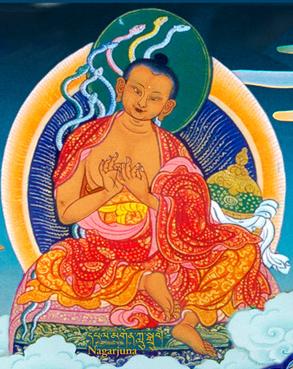Arya Nargarjuna
Mulamadhyamaka-karikas
Fundamentals of the Central Philosophy of Buddhism
 Section 27: An Analysis of the Views About Reality (dogmas)
Section 27: An Analysis of the Views About Reality (dogmas)
XXVII.1.
Those views relating to the limits of the past reality are: “The world is eternal,” etc.,
And “I have existed in the past,” “I have not existed in the past,” etc.
XXVII.2.
The assertion: “I will not become something different in a future time,”
“I will become something different,” and the alternative, etc., are relating to an end in the future.
XXVII.3.
The assertion: “I existed in a past time” does not obtain,
Since this present being is not that one who was in a former birth.
XXVII.4.
Were he in a previous birth, that individual self (atma) which he acquires in coming into existence would be different.
Moreover, what kind of individual self is there without acquisition (upadana)?
XXVII.5.
If it were held that: “There is no individual self without the acquisition,”
Then the individual self would be only the acquisition or it is not an individual self at all.
XXVII.6.
The individual self is not the acquisition, since that acquisition appears and disappears.
Now really, how will “he who acquires” become “that which is acquired?
XXVII.7.
Moreover, it does not obtain that the individual self is different from the acquisition.
If the individual self were different, it would be perceived without the acquisition; but in fact it is not so perceived.
XXVII.8.
Thus that individual self is not different from nor identical to the acquisition.
The individual self is not without acquisition; but there is no certainty that “It does not exist.”
XXVII.9.
The assertion: “I have not existed in a past time” does not obtain,
For that one now living is not different from that one who was in a former birth.
XXVII.10.
If that present person were different, he would exist in exclusion of that former one.
Therefore either that former person persists, or he would be born eternal!
XXVII.12.
There is no existing thing which is “that which has not existed prior.” Therefore, the error logically follows that
Either the individual self is “what is produced” or it originates without a cause.
XXVII.13.
Thus the view concerning the past which asserts “I have existed,” or “I have not existed,”
Both “existed and not existed” or neither: this does not obtain at all.
XXVII.14.
The views: “I will become something in a future time”
Or “I will not become something,” etc., should be considered like those views of the past.
XXVII.15.
If “This is a man, this is a god” obtains, then eternity exists,
For god is un-produced, and certainly something eternal would not be born.
XXVII.16.
If man is different from god, there would exist something non-eternal.
If man is different from god, then a continuity does not obtain. (i.e. they cannot be different)
XXVII.17.
If one part were divine and another part human, Then there would be something non-eternal together with that which is eternal; but that is not possible.
XXVII.18.
If something both non-eternal and eternal were proved,
Then, no doubt, something “neither eternal nor non-eternal” is proved.
XXVII.19.
If someone, having come from somewhere, in some way goes somewhere again,
Then there would be existence-in-flux with no beginning; but this is not the case.
XXVII.20.
If someone who is eternal does not exist, who will exist being non-eternal,
Or who being both eternal and non-eternal, or devoid of these two [characteristics] ?
XXVII.21.
If the world would come to an end, how would an other-world come into existence?
If the world would not come to an end, how would an other-world come into being?
XXVII.22.
Since the continuity of the “groups of universal elements” (skandhas) [from one moment to the next] functions like flames of lamps,
[The view:] “both having an end and not having an end” is not possible.
XXVII.23.
If the former [“groups”] would disappear, those [new] “groups” which are dependent on those [former] “groups” would not arise;
Therefore, the world would come to an end.
XXVII.24.
If the former [“groups”] would not disappear, these [new] “groups” which are dependent on those [former] “groups” would not arise;
Therefore, the world would be eternal.
XXVII.25.
If one part were finite and the other were infinite,
The world would be both finite and infinite; but this is not possible.
XXVII.26.
Therefore, how can it be that one part of “one who acquires” [karma] will be destroyed,
And one part not destroyed? This is not possible.
XXVII.27.
How, indeed, can it be that one part of the acquisition [of karma] will be destroyed,
And one part not destroyed? That, certainly does not obtain.
XXVII.28.
If the [view] “both finite and infinite” were proved,
Then no doubt, “neither finite nor infinite” could be proved.
XXVII.29.
Because of the emptiness of all existing things,
How will the views about “eternity,” etc., come into existence, about what, of whom, and of what kind?
XXVII.30.
To him, possessing compassion, who taught the real dharma
For the destruction of all views—to him, Gautama, I humbly offer reverence.
Source: Orientalia





